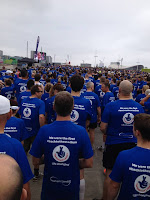Not many sportsmen or women can be recognised with the use of just their first or last name, but Usain Bolt is for one reason alone: he is the fastest man that has ever lived.
Although Bolt had previously been World Junior Champion, for many, the tall figure of this athlete stretching away from the rest of the 100 metre field in the Beijing 2008 Olympics was the first sight of his greatness. Bolt broke the world record clocking a time of 9.69 seconds. Yet what made this victory even more impressive was the fact he started to celebrate 10 metres before the finish line. Although Bolt was reported by some as being arrogant and disrespectful towards his fellow competitors, in my opinion he shocked himself at how far ahead he was, a lead like this was unthinkable for an Olympic 100m final. Things only got better for Bolt with the 200m to follow, which was his main event. He won the 200m final in similar record breaking style, making himself double Olympic Gold Champion, alongside making both a name and a pose for himself.
Following the Beijing Olympics, Bolt became the face of not only athletics, but adverts from sportswear to food products and broadband. As the fascination with his speed grew, so did the focus on this new sports personality. As with many stars, Bolt merchandise began to be produced and his name traveled to every town and city around the world. Questions into the reason for his speed, his training and whether he could run any faster began to capture sport scientists and the media.
Unlike many other top sprinters, Bolt standing at 6ft 5 inches is taller than the average sprinter, meaning his starting speed was often slower than the rest of the field. So is it his stride length? The fact he can maintain his maximum speed whilst others start to slow towards the end of the race? Or was it in fact that he ate a box of chicken nuggets the night before the final that propelled him to the gold? This may have been a frustrating for the hundreds of athletes that follow rigorous diets, but for the public, it added to his charm.
A year later and the World Championships in Berlin were upon us. As Bolt stood on the start line, he nodded to the camera as if to say 'you're about to see something special', which was, an understatement. 9.58 seconds. Unbelievable. What could make this even more extraordinary was his time of 19.19 seconds for the 200m. And with the surname Bolt, the puns were hitting every newspaper... lightning can strike twice. He had proved he wasn't a one trick pony and that he was to stay in this sport and inspire children and athletes around the world. Now Bolt could call himself a legend, surely?
Bolt continued to add to his medal tally and by London 2012 remained the favourite to win the Olympic triple; 100m, 200m and 4x100m relay. Yet leading up to the Olympics, the gap between Bolt and his competitors was narrowing. Bolt had admitted himself that he doesn't train as hard as the others in the Jamacian camp but that he had focused on his start, the 'weakest' part of his race. At London 2012, Bolt ran the second fastest time ever run over 100m (just behind his own world record) and became one of few athletes to successfully defend both their 100m and 200m Olympic golds. Yet it wasn't until this year, following his double win at the Moscow World Championships that admitted this legendary status, and rightly so.
So the question remains, can Usain Bolt be beaten? Can the fastest man in the world go any faster? Usain Bolt, the fastest man that's ever lived, the athlete, the showman. When will he be stopped, or when will he decide to stop?


